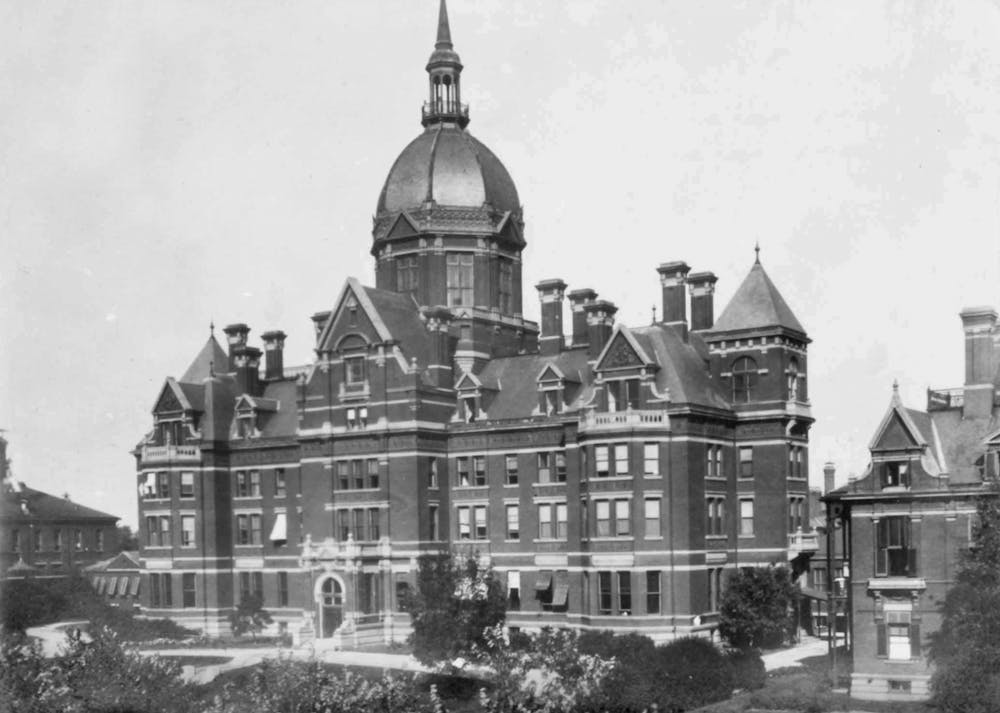As a part of its April Awareness Speaker series, the Diverse Sexuality and Gender Alliance hosted a talk by Jules Gill-Peterson on April 25.
Gill-Peterson is an associate professor at the Department of History. Her talk, titled “History and Harm: The Unfinished Trans Story of Johns Hopkins Hospital,” explored the University’s historic relation to trans and intersex communities and how this legacy continues today.
She explained that she began studying the history of Johns Hopkins Hospital for her book, Histories of the Transgender Child, which received the 2019 Lambda Literary Award for Transgender Nonfiction.
“I wanted to understand how trans youth… fit into the broader history of trans medicine and the history of medicine more broadly,” she said. “I found some kinds of hints and documents that there were some trans teenagers who had been to Johns Hopkins to transition as far back as the 1960s.”
The Johns Hopkins Hospital opened the nation’s first Gender Identity Clinic in 1966. From her research, Gill-Peterson found that Hopkins psychologists had lobbied for a teenager on trial for burglary to be granted gender affirmation surgery instead of prison over a year prior to the clinic’s opening.
Hopkins psychologists thought the teenager, known under the pseudonym GL, engaged in delinquent behavior because of their transgender identity. GL never received the gender-affirming surgery due to psychiatrists who disagreed with gender affirmation.
Although some clinicians viewed children’s developing bodies as an opportunity to experiment on sex and gender, many children at the time were denied access to gender-affirming care.
Gill-Peterson described how GL’s case illustrates the double bind that trans children found themselves in.
“In some cases like GL’s, trans kids found doctors who were willing to oversee them medically transition… but for most children clinicians were more interested in trying to stop them from being trans,” she said.
She discussed early twentieth-century medicine’s understanding of the plasticity of sex and gender, including the definition of the term “bisexual.”
“By bisexual, they meant that everyone was normally… somewhat of a mix of male and female characteristics,” she said. “This view held that humans never lost the potential to become the other sex.”
She emphasized that children became essential to this discourse on sex and gender’s plasticity because they seemed to be the strongest case to show gender undergoing changes during childhood which would resolve into a binary gender in adulthood.
John Money, a psychologist at Hopkins, encouraged the idea of plasticity through his views on sex and gender. Money was one of the psychologists who lobbied in favor of GL undergoing gender-affirmation surgery.
Gill-Peterson described Money’s outlook, noting that he viewed gender assignment as a social issue.
“Money began to say that [gender] was a social problem: that anyone whose gender doesn’t match their sex would likely suffer social stigma in the world,” she said. “Children would be bullied, they would feel upset… all social problems, not medical problems.”
She highlighted how Money’s perspective on gender led to unethical and dehumanizing medical practices for intersex people.
“Money, in particular, felt that if a child was just given a clear physical anatomical sex by surgery and hormones at an early enough age, doctors could assign a child any gender,” she said. “Of course, that wasn’t true, and over the years many children would grow up to find that they did not feel comfortable with the sex that they had been assigned.”
The original Hopkins Gender Identity Clinic closed in 1979 due to conservative pressures. Hopkins opened a new clinic in 2017, although Gill-Peterson emphasized that many people found themselves struggling to trust Hopkins after the harm the institution had committed against trans and intersex communities in the past.
She proposed ways for Hopkins to pay reparations to trans and intersex communities. Her ideas included Hopkins covering all gender-affirming surgeries for those under student and employee insurance, lobbying for Maryland to do the same for Medicaid and investing time and funds into starting discourse on institutional harm.
In an interview with The News-Letter, freshman Robbie Kuang described their appreciation for the conversation on reparations.
“It’s a very important conversation, and it’s one I hadn’t thought about before,” they said. “It was really nice to hear her thoughts on what reparations should be made and also on the other organizations that are working on similar objectives.”
Gill-Peterson discussed the Intersex Justice Project (IJP), which works to end medically unnecessary intersex surgeries on youth.
She highlighted the importance of the organization’s approach.
“IJP sees intersex medical harms as threads in a much larger, longer, anti-Black and colonial history of gendered violence in the US,” she said. “To IJP, intersex and trans organizing ducktails with movements for racial justice, decolonization and other Black indigenous and immigrant-led projects that are focused on institutional medicine.”
In an email to The News-Letter, freshman Maria-Noelia Herne, who attended the talk, stressed that Hopkins must recognize the harm it inflicted in order to make reparations.
“Johns Hopkins Hospital acknowledging the complex history with trans youth is a first step since before the talk, I never knew about this,” she wrote. “I believe acknowledgment is the first (but not only) step to achieving justice and healing.”





